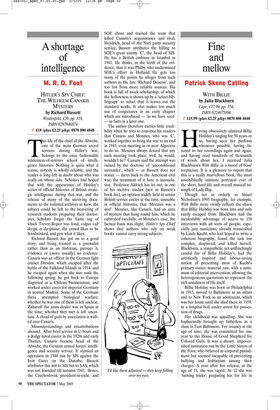A shortage of intelligence
M. R. D. Foot
HITLER’S SPY CHIEF: THE WILHELM CANARIS MYSTERY by Richard Bassett Weidenfeld, £20, pp. 319, ISBN 0297846874 ✆ £18 (plus £2.25 p&p) 0870 800 4848 This life of the chief of the Abwehr, one of the main German secret services during Hitler’s war, belongs to the once fashionable wilderness-of-mirrors school of intelligence histories. Nothing is quite what it seems, nobody is wholly reliable, and the reader is long left in doubt about who was really on whose side. Scholars had hoped that with the appearance of Hinsley’s series of official histories of British strategic intelligence during that war, and the release of many of the surviving documents to the national archives at Kew, the subject could be left to the beavering of research students preparing their doctorates. Scholars forget the Latin tag of which Trevor-Roper was fond, vulgus vult decipi, et decipiatur, the crowd likes to be hoodwinked, and gets what it likes.
Richard Bassett has got on to a good story, and being trained as a journalist rather than as an historian, pursues it, evidence or (more usually) no evidence. Canaris was an officer in the German light cruiser Dresden, which escaped after the battle of the Falkland Islands in 1914, and he escaped again when she was sunk the following spring; he got back to Europe disguised as a Chilean businessman, and worked under cover for imperial Germany in neutral Madrid. Some of the Germans there attempted biological warfare; whether he was one of them is left unclear. Zaharoff the arms dealer was in Spain at the time; whether they met is left uncertain. A cloud of guilt by association is wafted over Canaris.
Misunderstandings and misattributions abound. After brief service in U-boats and a dodgy naval career in the 1920s and early Thirties, Canaris became head of the Abwehr, the German armed forces’ intelligence and security service. It stymied an operation in 1940 run by SIS against the Iron Gates on the Danube; Bassett attributes this not to SIS but to SAS, which was not founded till autumn 1941. Benes, the Czechoslovak president-in-exile, and SOE chose and trained the team that killed Canaris’s acquaintance and rival, Heydrich, head of the Nazi party security service; Bassett attributes the killing to SOE’s great enemy ‘C’, the head of SIS. He has a British embassy in Istanbul in 1941. He thinks, in the teeth of the evidence, that it was Philby who undermined SOE’s effort in Holland. He gets too many of the points he alleges from such authors as the late ‘Richard Deacon’, and too few from more reliable sources. His book is full of mock scholarship, of which the hollowness is shown up by a ‘select bibliograpy’ so select that it leaves out the standard works. It also makes too much use of conjectures in an early chapter which are introduced — ‘as we have seen’ — as facts in a later one.
The author therefore carries little credibility when he tries to convince his readers that Canaris and Menzies, who was ‘C’, worked together to bring the war to an end in 1943, even meeting in or near Algeciras to do so. Menzies always denied that any such meeting took place; well, he would, wouldn’t he? Canaris said the attempt was ruined by the doctrine of ‘unconditional surrender’, which — as Bassett does not notice — dates back to the American civil war; the treatment of it here is inconclusive. Professor Aldrich has let out, in one of his incisive studies (not in Bassett’s book list), an opinion widely held in senior British service circles at the time, unusable in official histories, that ‘Menzies was a dud’. Menzies, like Canaris, had an aura of mystery that hung round him, which he cultivated carefully; in Menzies’s case, the factual basis was slight. Hitler’s Spy Chief shows that authors who rely on weak books cannot carry strong subjects.



























































 Previous page
Previous page